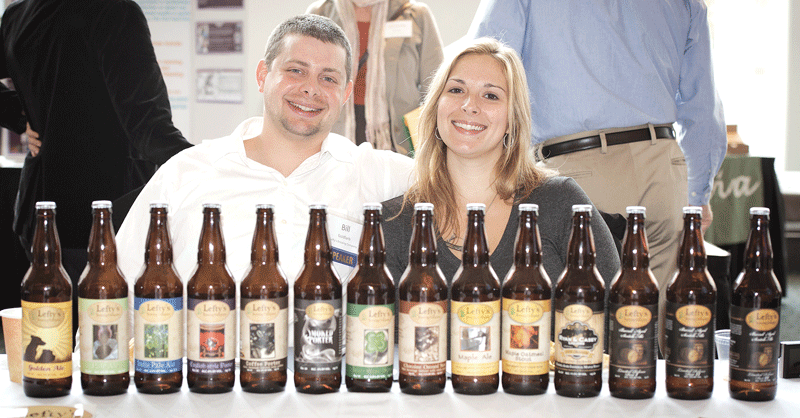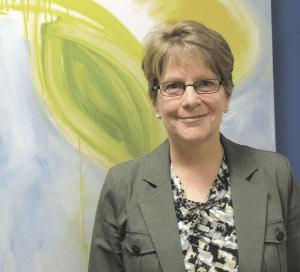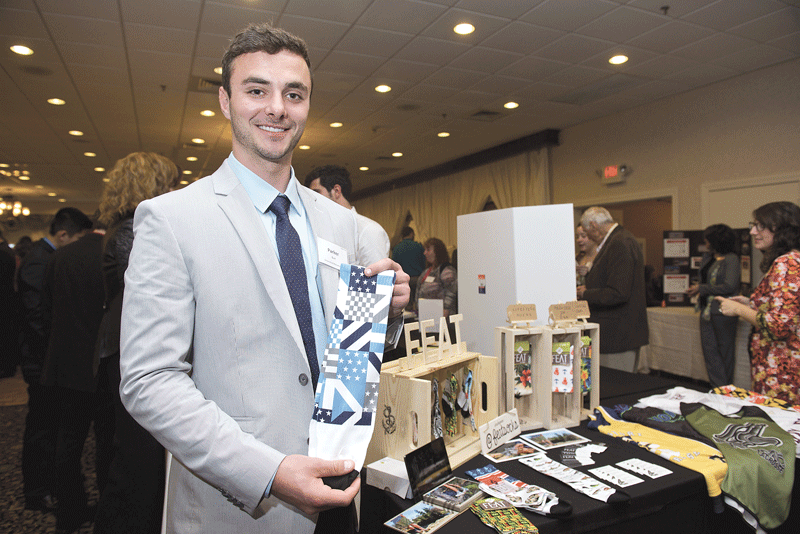
Planting Seeds
Grinspoon Foundation Inspires Students’ Entrepreneurial Dreams

Bill Goldfarb and his wife, Melissa, display products from Lefty’s Brewery at a Grinspoon conference.
“I was going to Greenfield Community College, taking business classes,” Goldfarb said. “While I was there, a professor recommended I apply for a Grinspoon Foundation award, so we put together a presentation, and I was picked for a grant. That was the first funding I received for my company, and that helped me get my first set of brewing equipment. That was huge.”
These days, as Lefty’s Brewery celebrates its fifth anniversary, the Bernardston-based enterprise boasts 10 employees and about 250 clients — and can trace its success back to that one initial award from the Harold Grinspoon Charitable Foundation, the arm of the Harold Grinspoon Foundation that supports entrepreneurship efforts among young adults.
But the value of that $1,000 award went well beyond a dollar figure, he added.
“Obviously, the financial part was extremely helpful,” he told BusinessWest, “but just the encouragement from my professors, and the encouragement through the Grinspoon Foundation for student entrepreneurs, helped me lay the groundwork for a lot of business planning, as well as giving me the incentive that this was something I could do. It was my incentive to get the ball rolling.”
And roll it has. Lefty’s Brewery crafted 128 barrels in its first year; it’s on track for 2,000 barrels this year. “I’d say that’s decent growth, to say the least,” Goldfarb said. “Things are moving right along for us.”
His is not an isolated story.
Indeed, since launching his entrepreneurship programs in 2003, Grinspoon and his staff have supported more than 525 college students with more than $500,000 in grants, through a series of tiered programs aimed at different stages of the startup process.
“Harold’s vision is for college students to understand that entrepreneurship is not only a viable option, but also a prestigious one,” said Cari Carpenter, director of entrepreneurship initiatives at the Grinspoon Charitable Foundation.
“Over the past 12 years, we have engaged all 14 colleges in the Valley in an endeavor to collaborate to really support students exploring those career options,” she added. “I really think the fact that we have this intercollegiate collaboration, where each college has a faculty-member liaison on campus, and they encourage students to participate in our high-profile events, encourages business creation in the Pioneer Valley.”

Cari Carpenter says the foundation encourages students to see entrepreneurship as a viable, even prestigious, career option.
From Idea to Reality
The foundation actually offers four types of awards each year, each aimed at a different stage of the startup experience: elevator-pitch awards for compelling ideas, concept awards for startups in the pre-revenue stage, Entrepreneurial Spirit awards for companies that have begun to generate revenue, and alumni awards for later-stage successes.
The foundation’s annual spring banquet — this year slated for April 22 at the Log Cabin in Holyoke, with keynote speaker Aaron St. John, co-founder of HitPoint Studios — attracts about 600 attendees, including budding entrepreneurs from all 14 colleges and universities. The event features the presentation of the Spirit awards and the elevator-pitch competition, which is financially supported by local banks and judged by commercial bankers.
Meanwhile, an annual fall event, typically drawing about 500 people, is positioned more as an educational program, with speakers and breakout sessions giving students an opportunity to learn more about entrepreneurship. “In many cases,” Carpenter said, “it’s their first professional conference.”
Parker Burr was one beneficiary of a Spirit Award, earning $1,000 last spring after being nominated by a professor at UMass Amherst. Combined with $200 he had won in a class competition, Burr put the funds toward his first piece of equipment — a hot-iron press — for a sock-making enterprise he calls Feat Socks.
“Feat Socks are printed by hand right here in Amherst,” he explained. “I’m basically trying to create a sock for every shoe; we don’t want to sell you a running sock, a dress sock, a business sock … we want your sock to go with any shoe. Our patterns and designs are a little more unique than the next company because we’re not printing hundreds of the same sock. These are handmade in Western Mass.”
Like Goldfarb, he said the Grinspoon award was critical to simply getting production rolling. “I’m still using the equipment I bought to print today. That’s what really got me going.”
Carpenter cited, as another example, Marcie Muehlke, who won an award several years ago that helped her launch Celia Grace, an Amherst-based company that sells fair-trade wedding dresses.
“She got married and couldn’t find anything in the parameters of fair-trade wedding gowns,” Carpenter explained, adding that Muehlke began working with seamstresses in Cambodia and India whose shops abide by safe working conditions, pay a living wage, and prohibit child labor. “Again, she called her award a vote of confidence that allowed her to get started.”
Many of the startups that benefit from Grinspoon’s programs were similarly born from a passion or an interest — everything from supporting overseas labor standards, as Muehlke does, to installing custom beer taps in bars, restaurants, and ‘man caves,’ as Audra Quintin decided to do as an MBA student at Bay Path University. Today, Wilbraham-based East Coast Taps continues to expand right along with the ever-growing craft-beer market.
“When I asked her how the Spirit Award helped her,” Carpenter recalled, “she said, ‘this really was one of the first votes of confidence in our idea. It allowed me to purchase some materials and make the first prototype and buy some marketing materials and really start to expand.’”
She returned to the concept of a ‘vote of confidence’ several times while talking with BusinessWest. “I think that’s a huge aspect of this. And when we do these high-profile events, and when students at the early stage of business see other students at the early stage, it’s very contagious to be part of all that energy.”
Reason to Believe
Lauren Way agreed.
“It’s not only money, but support,” said Way, director of the master’s program in Higher Education Administration at Bay Path University, who also advises students in Grinspoon entrepreneurship initiatives. “That money says people believe in you, and that alone has an emotional underpinning — ‘yes, this is real, what you’re doing is real, and we support it and applaud it, and we’ll give you money to advance it.’”
That’s a critical part of the foundation’s entrepreneurship initiatives, Carpenter said. “Mr. Grinspoon wants to reward them, not only with financial awards, but with public recognition.”
Not all ideas will be successful, of course, and some young entrepreneurs don’t find a winner with long-term potential until their third or fourth different attempt, she noted. And not every startup has designs on explosive growth.
“Lots of students have done less-scalable types of businesses — custom greeting cards, woodworking, we’ve had students start landscaping businesses … it just runs the gamut. When we go to events, we see the breadth of their ideas.”
Way said the Grinspoon programs have helped to cultivate a culture of entrepreneurship on campuses and collaboration among them.
“It’s a catalyst for the schools to work together in ways they otherwise wouldn’t work together and share best practices,” she told BusinessWest. “It’s also a catalyst for schools to make more of an impact on the community than they could do individually. Finally, it brings students together at these events in large numbers, where they get to know each other’s work as well as compete with each other.”Way noted that grant applicants aren’t just young 20-somethings, but many are older adults with past business experience or startups well past the initial stages. She recalled one whose business was on track to make $1 million in its first year. “The [award] money doesn’t matter to her. But she really wanted that award.”
The reasons for such enthusiasm are varied. “Winning means you can put the recognition on your website and in press releases. You can call yourself an award-winning business. It’s huge. So, I feel like the foundation helps us reach students at both ends of the spectrum.”
At a time when local economic-development leaders are emphasizing the importance of entrepreneurship to the region’s vitality, Carpenter said, the collaborations being encouraged by these initatives is especially valuable.
“We feel like a critical part of this ecosystem. We are very closely tied into other initiatives and programs in the region,” she noted, making a point of crediting Valley Venture Mentors for its accelerator program, offering incubator support to burgeoning startups.
“College students have very developed mentoring programs, but once they graduate, once their businesses get to a certain stage, there isn’t a lot for them,” she went on. “[VVM] has created this mentoring program, and we have been a feeder with some of our awardees going into their mentoring programs, into their accelerator. They’ve been very supportive.”
VVM has also opened its doors to college students to work internships with companies in its accelerator — a win-win for the students to gain business experience, and the startups to gain low-cost assistance in taking their enterprises to the next level, Carpenter added. “We have a very nice relationship with them; they’re so supportive, and what they’re doing is so important.”
Dance Fever
Carpenter told BusinessWest how Grinspoon, after the spring banquet a few years ago, told her to add a dance competition. He wasn’t joking.
“So we give $100 awards for the 10 best dancers,” she said. “He was thinking, there’s so much positive energy at this event, and it dissipates when people walk out the door. So he wanted to capture that fun and energy. It’s really fun; the students love it.”
The exuberance of the spring event finds a counterpart in the nitty-gritty of the fall seminar, Way said, and together, they inspire and educate potential entrepreneurs — two ways of encouraging the next generation of business successes. “They come together with students from other schools, and say, ‘wow, this is a viable career path for me.’”
Joseph Bednar can be reached at [email protected]







